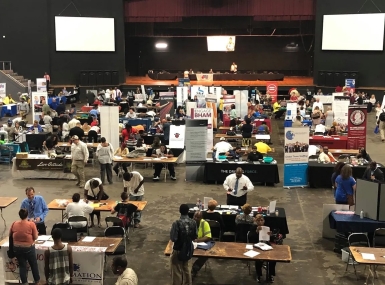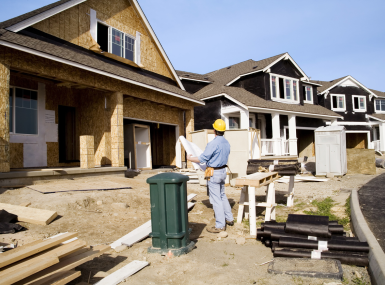Building deconstruction program offers job training
Upcoming Events
Related News
The old adage, one person’s trash can be someone else’s treasure, is being put to the test in Oakland County, Mich. — with a little help from Treasurer Andy Meisner’s office.
A new architectural salvage training program in Pontiac, the county seat, is teaching 10 jobless or underemployed men the art and science of building deconstruction (there are no women in the current class, but they are eligible). And they’re earning while they learn.
The program, Revive Pontiac, owes a debt of thanks to Meisner’s office, which is making tax-foreclosed properties available at “little or no cost” to be salvaged before they’re demolished.
“It took five years to get it going,” said Chris Rutherford, executive director of Architectural Salvage Warehouse of Detroit, which provides the training at no cost. “But it’s fantastic because the major difference between what we do in Detroit and what we’re doing now in Pontiac is that we’ve got the full support of the (county) treasurer’s office, the mayor’s office, and not just lip service.”
Trainees earn $14 per hour during the program, and in addition to building deconstruction skills, they can obtain other certifications to make themselves more “marketable,” such as CPR and first-aid.
“They also learn asbestos awareness and lead safe work practices,” Rutherford added. “As this program progresses, we’ll likely send some of the top-tier candidates to asbestos supervisor training.” To date, they’ve reclaimed materials from a vacant apartment building as well as single-family homes.
Pontiac, a former General Motors company town, is a city that could use some reviving. Unemployment in the city hovers around 25 percent, while it’s 4 percent or less in all of Oakland County, according to Ron Borngesser, CEO of the Oakland Livingston Human Service Agency (OLHSA), which runs the program.
Rutherford explained, “It’s putting these guys to work, removing the blight in their communities, creating jobs, expanding the tax base, preserving the balance of the neighborhoods that aren’t blighted.”
The idea for such a program had been tossed around for at least five years before the Revive Pontiac was launched in April, Meisner said, but there was a hitch.
“There was a worker training component to it that was really attractive, and that there was a community development component to it,” Meissner said. “But the piece we didn’t have five years ago was, ‘How the heck to we pay for this thing?’”
He and OLHSA found inspiration 30 miles south, where AWSD is doing a thriving business in selling reclaimed materials from deconstructed buildings. Anything from old fireplace mantels to sconces to columns to floorboards, you name it.
“It was really OLHSA who most clearly recognized the benefits of the deconstruction effort and who offered to put themselves on the line by not only serving as the fiduciary for the program,” said Meisner, “but also taking a leadership role to try to attract funds to support the program and get it started which they did thru some funding from the state.”
The agency won a $150,000 grant from the Michigan Economic Development Corp. that served as seed money and pays the trainees’ wages. It also covers the costs of work clothes, boots and tools, Borngesser said.
“Our goal is to be harvesting enough material to keep the program sustainable. There’s a big market out there of people who want to use reclaimed materials in their homes, and they’ll pay a substantial amount of money to do that,” he added.
“If we’re good business people we’ll be able to make it self-sustaining by just selling the product just as a regular business would be doing.”
According to the Construction & Demolition Recycling Association the reclamation, recycling or reuse of building materials is a $7.4 billion industry. The American Institute of Architects estimates that 25 percent to 40 percent of the nation’s solid waste is building-related waste and only 20 percent of construction waste or demolition debris is recycled.
Items reclaimed in the Revive Pontiac program will be sold at a storefront in downtown Pontiac that OLHSA is leasing, which will create additional jobs for salespeople. “That’s why the treasurer’s office is so excited about it,” Rutherford said, “they see that this is all a potential windfall for Pontiac and for the greater metro region because of all those aspects that can then multiply.”
Rutherford said he’s been impressed with the quality of work the trainees are performing.
“I’ve trained a lot of cohorts in a lot of different things, and this is the best group we’ve ever had; we’re really excited about this group,” he said. “They’re extremely productive. In fact, we just did a full deconstruction of a small house, about 1,000 square feet, in three days. That’s a job that usually takes eight to 10 days, and this is all with trainees.
“They’re a great group and they’re both hard-working, and they’re grasping all of the book side of it very well.”
Maurice Bell, 25, is one of those trainees; he hopes to parlay his new skills into doing renovation work. He’d been unemployed for about five months before he started. “We’re the first ones out the gate,” he said. “They’re teaching me everything, I’m learning how a house is made, how to take it down, how to put it up, just everything. I’m learning every day.”
Attachments
Related News

Counties offer a second chance after incarceration
From job fairs and housing programs to educational opportunities, counties offer a second chance after incarceration.

County shines light on property deed history of racially restrictive covenants
The Durham County, N.C. Register of Deeds is using public records information and archival documentation to educate county residents on racially restrictive covenants in property deeds and how their impact can still be felt today.
